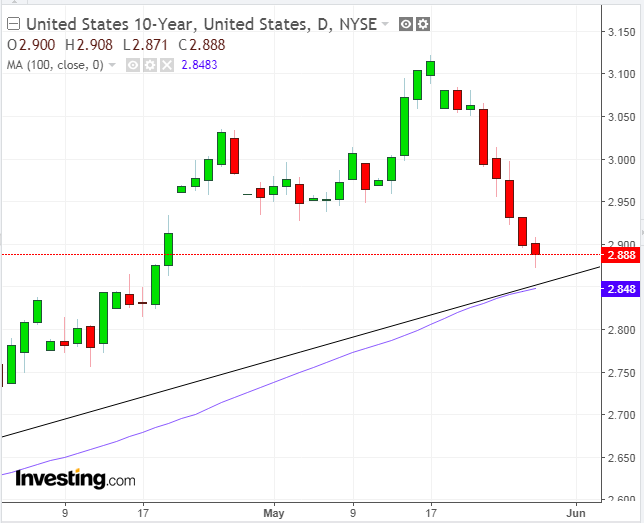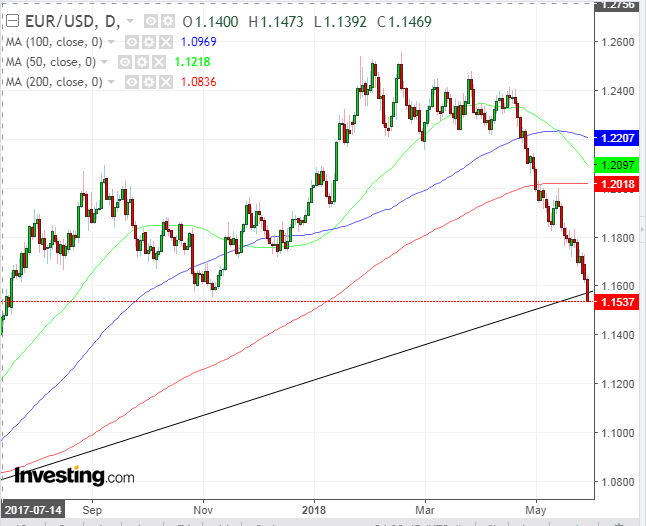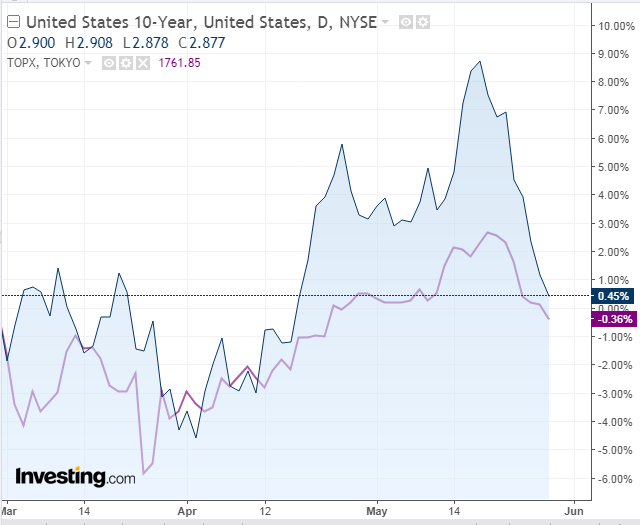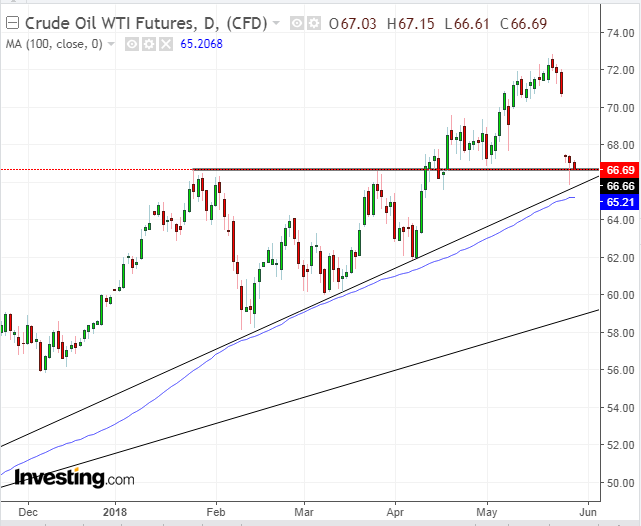-
Yields on 10-year Treasurys fell below 2.9 percent, lifting dollar
- Global equities take a beating from mounting political risk in Europe
-
Euro registers lower trough and crosses below uptrend line since 2007
-
Oil nears multiple support levels on reports of Russia-OPEC supply pick up
Key Events
Bond markets are yet again driving equities this morning, after political instability in Italy increased, sparking a global stock selloff as UK trading resumed after a Bank Holiday and US markets reopen after the Memorial Day weekend.
Yields on 10-year Treasurys fell for the fifth consecutive day, slipping below the 2.90 percent level for the first time this month as investors sought the safety of government bonds. US futures on the S&P 500, Dow and NASDAQ 100 slid alongside European stocks, which in turn mirrored losses across Asian markets. From a technical perspective, 10-year yields neared an uptrend line since early September, 'guarded' by the 100 DMA, then rebounded, paring about half of the decline seen in early trade.
Europe's STOXX 600 dropped 0.65 percent, opening with a falling gap, then extending losses to minus 0.75 percent—where the pan-European benchmark index remained under pressure. At the time of writing, the index has slipped to -1.46 percent. The price broke out of a three day consolidation.
The euro also edged 0.5 percent lower and is currently trading at the very lowest pip of the day. This marks the third consecutive daily decline for the single currency (for an aggregate loss of 1.2 percent) as well as its tenth daily decline (-3.1 percent) out of 12 sessions, or 22 daily declines out of 20 sessions (-6.5 percent). Technically, the euro is flirting with a reversal, as it is registering a lower trough than the last one it posted, by breaching the uptrend line since January 2017, reaching the lowest since July 18.
Global Financial Affairs
The added losses we're seeing today for the EUR/USD are a direct consequence of mounting political turmoil in Italy, Europe's third largest economy. On Sunday, Italian President Sergio Mattarella rejected the appointment of a euroskeptic economist as minister of finance, thereby throwing the incoming government proposed by the 5 Star Movement - League coalition into question. The move stepped up the prospect of a new round of elections, with political campaigns likely to be fought on the battleground of Italy's participation to the single currency bloc—which, in turn, re-ignites the specter of a euroskeptic wave across the continent.
Earlier, during the Asian session, Japan's TOPIX dropped 0.45 percent, dragged lower by iPhone screen makers such as Japan Display (T:6740). Shares of the LED screen specialist tumbled more than 20 percent, on news that Apple (NASDAQ:AAPL) has decided to use OLED screens for all three of its new iPhone models, which will be released next year. The report, published by South Korea's Electronic Times, weighed on shares of the company, which posted their biggest plunge since the Japan Display went public in 2014. Sharp (T:6753) lost 3.6 percent and Samsung (KS:005930) slid 1.2 percent.
Japan's broadest index was also pulled lower by steelmakers, which are particularly sensitive to changes in the domestic currency due to their reliance on exports. The yen benefited from the fact that sliding 10-year Treasury yields pulled the dollar lower against the Japanese currency.
Overall, it was the sixth decline out of seven sessions for the TOPIX, which hit its lowest level since April 25.
Chinese stocks listed on the Shanghai Composite edged 0.1 percent lower, after fluctuating between a 0.4 percent gain and 0.5 percent loss. This marks the fifth straight declining session for the mainland index, for an aggregate 2.6 percent slide—the largest drop since May 7. Hong Kong's Hang Seng lost 0.6 percent, on the downbeat performance of financial stocks. The biggest laggard was insurer AIA (HK:1299), which plunged 1.25 percent.
South Korea's KOSPI dropped 0.75 percent, led by losses from bank shares. The index's price has been consolidating since May 9.
Australia's S&P/ASX 200 bucked the trend, helped by gains of bank shares. Bargain hunters were in fact bidding up prices, which have been on a downward trajectory since the start of a judicial inquiry into financial misconduct by Australian credit institutions back in March.Energy sector stocks also recouped some overnight losses. The price rebound comes after 8 negative sessions out 10, which pushed stocks to their lowest levels since May 1.
The political crisis in Italy, as noted above, has reawakened fears of an imploding European Union, something that had subsided since the 2016 Brexit vote. It also signals the growing strengthening of far-right wing, populist parties across Europe for the first time since WWII.
Still, as we've repeatedly been saying, investors appear to have stopped caring about geopolitical risk ever since global markets didn't crash in the aftermath of the unexpected result of the UK vote.
The price of oil dropped 0.4 percent on Tuesday's early session, extending losses for a sixth straight day, to a combined 7.8 percent drop. WTI is taking a hit from reports that Russia and OPEC members are considering lifting production limits to ward off potential supply glitches stemming from sanctions in Iran and the collapse of Venezuela's economy.
Technically, after the price of oil neared the uptrend line since September 4th, 'guarded' by the 100 DMA, it bounced back. Furthermore, the uptrend line is the bottom part of an ascending triangle. After the price dipped below its upper boundary, it rebounded and closed above that level. Therefore, today's decline may be considered a buying dip, as the price nears a plethora of converging supports. This is an exceptional opportunity from a risk-reward standpoint.
Ethereum Classic's hard fork is scheduled for today. It's intended to remove the 'difficulty bomb' that could otherwise cause mining issues related to future profitability.
Up Ahead
-
EU trade chief Cecilia Malmstrom and US Commerce Secretary Wilbur Ross are scheduled to meet on Wednesday in an informal World Trade Organization summit in Paris.
-
The US jobs report for May—the last, pivotal employment reading before the Fed's next monetary policy meeting which takes place in June—comes out on Friday.
-
Automakers report US sales for May on Friday.
-
Also on Friday, 234 China large cap A shares will officially be included in MSCI's global indexes.
-
On Saturday, US Secretary of Commerce Wilbur Ross will travel to Beijing for more talks with Vice Premier Liu He, covering trade and issues surrounding Chinese telecom group ZTE (HK:0763).
Market Moves
Stocks
-
The STOXX Europe 600 dropped 0.6 percent, to the lowest level in more than three weeks.
-
Futures on the S&P 500 fell 0.3 percent, to the lowest level in two weeks.
-
The UK’s FTSE 100 lost 0.7 percent, to the lowest level in almost three weeks.
-
Germany’s DAX ticked 0.6 percent lower.
-
The MSCI Emerging Market Index slid 0.7 percent, to the lowest level in more than five months.
-
The MSCI Asia Pacific Index lost 0.4 percent, to the lowest level in almost three weeks on the biggest fall in two weeks.
Currencies
-
The Dollar Index gained 0.3 percent to the highest level in more than five months.
-
The euro slid 0.3 percent to $1.1593, the weakest level in almost seven months.
-
The British pound fell 0.2 percent to $1.3285, the weakest level in about six months.
-
The Japanese yen climbed 0.5 percent to 108.92 per dollar, the strongest level in five weeks.
-
The Turkish lira declined 0.2 percent to 4.5914 per dollar.
Bonds
-
The yield on 10-year Treasuries fell five basis points to 2.88 percent, reaching the lowest in almost six weeks on its sixth straight decline.
-
Germany’s 10-year yield dipped four basis points to 0.30 percent, hitting the lowest in more than five months with its fifth straight decline.
-
Britain’s 10-year yield fell six basis points to 1.321 percent, reaching the lowest in 20 weeks on its fifth straight decline.
-
Italy’s 10-year yield climbed 19 basis points to 2.869 percent, the highest in almost four years.
Commodities
-
West Texas Intermediate crude fell 1.8 percent to $66.69 a barrel, reaching the lowest in six weeks on its fifth consecutive decline.
-
Gold dipped 0.1 percent to $1,296.78 an ounce.
-
Brent crude gained 0.2 percent to $75.42 a barrel.




